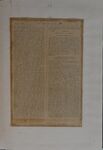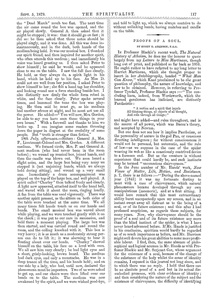< Experiences in Spiritualism (continued from page 10-28) >
the “Dead March’" much too fast. The next time the air came round the box was opened, and the air played slowly. General A. then asked that it might be stopped; it was: that it should go on fast; it did so: he then asked that three notes should be played singly, and it was done. All this was done instantaneously, and in the dark, both hands of the medium being held. It was our musical box. I thanked our spirit friend, and then inquired for another spirit, who often attends this medium; and immediately his voice was heard greeting us. I then asked Peter to show himself; he said he would, and he appeared close to me on the table. I saw the full face clearly. He held, as they always do, a spirit light in his hand, which he held up to his face. As Miss D. could not see well from her position, I asked Peter to show himself to her; she felt a hand tap her shoulder, and looking round saw a form standing beside her. I also distinctly saw dimly the whole form robed in white, and the face clearly. Peter spoke several times, and hummed the tune the box was playing. He then said he must go, as his medium had another stance at night, and he must not use all the power. He added—“You will now, Mrs. Gordon, be able to say you have seen these things in your own house.” With a farewell and thanks to him we broke up. I can imagine some readers throwing down the paper in disgust at the credulity of some A people. But “truth is stranger than fiction.”
18th July, afternoon.—Sitters: General A., Mrs. P., Lieutenant-Colonel and Mrs. Gordon. A different h medium. We formed circle, Mrs. P. and General A. next medium (who had never been in the room before); we wound up musical box, joined hands, and then the candle was blown out. We soon beard a slight noise, and the large box being very noisy we stopped it (not unjoining hands, which we always hold during sitting), and wound up a very small one. Immediately a drum accompaniment was played on the top of the large box, and well played. A spirit called “Charley” then talked freely and clearly. A light now appeared, attached itself to the hand bell, and waved with it about the room, ringing loudly, A fan from the table was used vigorously. There was another spirit present, as the sitters on both sides of the table were touched at the same time. We all many times felt hands touch us on our hands and beads. The small musical box was waved about while playing, and we were touched gently with it on the check; it was put to our ears in succession, and held there a moment playing. The large box was then started, and was carried round and round the room, and the ceiling knocked with it. This box is very heavy; it is as much as a moderately strong person can do to lift it; it was alarming to hear it floating about over our heads. “Charley” showed himself on the table, his face on a level with ours. We all saw him very clearly; he had light eyes and a short, grisly-looking, brown beard. The medium had dark eyes, and only a moustache. He was in a deep trance all the time, and his hands held; and on fi one side by a lady, who had, until now, declared the phenomena must be imposture. Two of us were asked to get up, and our chairs were then lifted over our heads on to the table. The medium was now awakened by the spirit, and we were wished good-bye, and told to light up, which we always contrive to do without unlinking hands, having matches and candle on the table.
Proofs of a Soul
In Professor Blackic’s recent work, The Natural History of Atheism, he does me the honour to quote largely from my Letters to Hiss Martineau, though long out of print, and published so far back as 1851. He ought rather to have referred to my long letter to Harriet Martineau, which she thought proper to insert in her Autobiography, headed “What Man Can Know,” which Kant proclaimed to be the great question of philosophy, the nature of knowledge, and how to be obtained. However, in referring to Professor Tyndall, Professor Blackie says:—“The concluding lines, indeed, from Wordsworth, which the learned gentleman has italicised, arc distinctly Pantheistic:
“A motion and a spirit that impels |
and might have added—and rules throughout, and is the source of all power, which was Bacon’s theory, and accepted by Newton.
But one does not see how it implies Pantheism, or the personality of nature in the god Pan, or conscious directing intelligence; for without consciousness it would not be personal, but automatic, and the rule of law—as we suppose in the case of the spider weaving its web so like a consciously contrived device to a foreseen end. But as the creature is without experience that could hardly be, and such instincts may be termed “unconscious clairvoyance.”
In the June number of Mr. Hands’ work, New Views of Matter, Life, Motion, and Resistance, p. 7, there is as follows:—“During the above-named year (1845) it was my fortunate destiny to meet with a case of clairvoyance, which natural phenomenon became developed through my own manipulations (mesmeric), and at a first sitting. I would here remark that this most extraordinary ability burst unexpectedly upon my senses, and in an instant swept away all distrust as to the being of a soul, or of its future existence; and this after I had professed scepticism, as regards these subjects, for many years. Now, why clairvoyance should be the proof of a soul and of its future existence any more than the blind instinct of the spider, is what I have never heard advanced before. If Mr. Hands is justified in his conclusion, spiritism would hardly be regarded as of so much importance as before, and Mr. Harrison might well devote his great abilities to some more profitable labour. I find, then, the same absence of philosophical and logical acumen in Mr. Hands as with Professor Blackie and Mr. Serjeant Cox, whose argument for the existence of a soul, because of the change of the substance of the body whilst the sense of identity remains, I exposed in this journal not long since, and to which there was no reply. I hold that there can be no absolute proof of a soul but in its actual disembodied presence, with clear evidence of identity; and then considering the nature of the subject and the existence of clairvoyance, the difficulty of identifying <... continues on page 10-30 >
Editor's notes
- ↑ Proofs of a Soul by Atkinson Henry G, F.G.S., London Spiritualist, No. 367, September 5, 1879, pp. 117-18
Sources
-
London Spiritualist, No. 367, September 5, 1879, pp. 117-18


